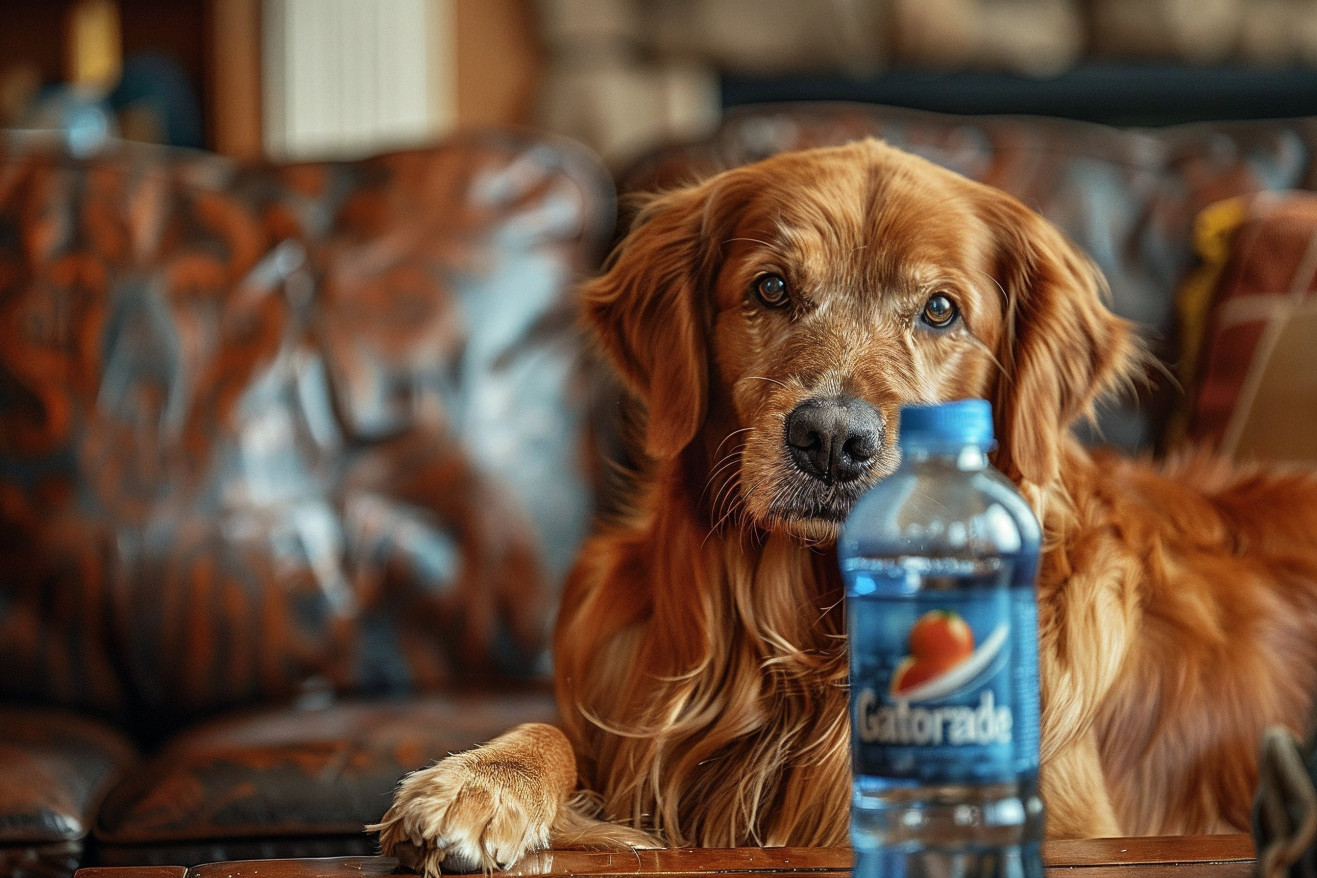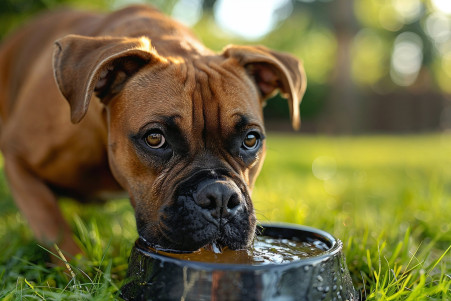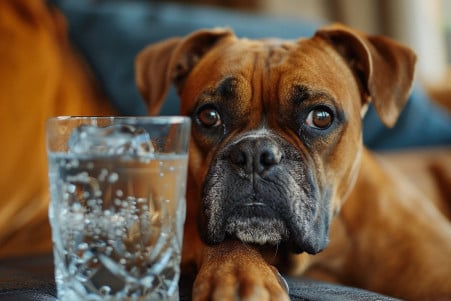Can Dogs Have Gatorade? Safer Hydration Alternatives Explained
28 February 2024 • Updated 27 February 2024

While Gatorade is great for humans, you may be wondering if it’s a good option for your dog. While dogs can have small amounts of Gatorade to help them rehydrate in a pinch, it’s not the best option due to its high sugar and sodium content. Dogs are better off sticking to water for hydration, and there are vet-approved electrolyte solutions that are better options if your dog needs to rehydrate.
This article will explore the impact of sports drinks like Gatorade on dogs through a review of veterinary literature and nutritional research. It will also look at the nutritional needs of dogs, the potential dangers of the ingredients in these drinks, and safer alternatives. The hope is to give you the information you need to make the best choices for your dog’s hydration and health.
Can dogs have Gatorade?
Knowing How Much Water Dogs Need
Just like humans, hydration is the foundation of health and physiological processes for dogs. Water helps dogs regulate their body temperature, support their organs, and maintain their joints, among other important tasks. According to BetterVet, dogs need about one ounce of water per pound of body weight per day, although this can depend on a dog’s size, age, activity level, and the temperature of their environment.
Hepper lists the signs of dehydration in dogs, which include sunken eyes, lethargy, and loss of skin elasticity. If dehydration is left untreated, it can lead to more serious health issues, like heatstroke and kidney problems. The differences between human and dog hydration needs are clear, especially when you consider that some human hydration products can be toxic to dogs.
To make sure dogs stay hydrated, Pet Honesty recommends that dog owners make sure their pets always have access to fresh water, keep an eye on how much water they’re drinking, and know the signs of dehydration. It’s also important to remember that when looking at the ingredients in sports drinks like Gatorade, the formulas that are made for humans may not be nutritionally complete or healthy for dogs.
Gatorade Ingredients Are Harmful to Dogs
Although Gatorade can help humans rehydrate, the ingredients in sports drinks can be harmful to dogs. For example, sugar, which is a major component of sports drinks, can lead to obesity and diabetes in dogs, according to MasterClass.
While sugar isn’t toxic, Trupanion explains that it can cause gastrointestinal upset and metabolic changes in dogs if it’s consumed in large amounts. In addition, artificial sweeteners are a concern, with xylitol, which is used in some sugar-free drinks, being especially dangerous to dogs and causing hypoglycemia and liver failure.
In addition, the electrolyte ratios in sports drinks made for humans aren’t right for dogs, and this can lead to electrolyte imbalances. A study in the Journal of Small Animal Practice shows that pet food additives, including those found in sports drinks, are closely monitored by professionals to make sure they’re safe, which shows that it’s important for dogs to have their own dietary needs taken into account.
Knowing this, it’s important to make sure that dogs have access to safe, species-appropriate hydration options that are tailored to their specific dietary and physiological needs.
Electrolytes and Canine Nutrition
Electrolytes are minerals that carry an electric charge and are essential for a variety of bodily functions, including nerve signaling, muscle contractions, and hydration. Electrolytes like sodium, potassium, and chloride are typically consumed in a balanced diet that includes meat, grains, and vegetables. A study in the Journal of Veterinary Medical Science found that dogs’ bodies are able to regulate electrolyte balance effectively, even during intense activities like agility competitions.
However, electrolyte imbalances can occur as a result of physical activity, especially in extreme conditions. A study published in PMC found that veterinarians often treat these imbalances with electrolyte-enriched fluids, especially in the case of working dogs, who may not show signs of heat stress even when their body temperatures reach dangerous levels.
This is because sports drinks like Gatorade are formulated to meet the electrolyte needs of human athletes and may not meet the nutritional requirements or metabolic responses of dogs.
Knowing how electrolyte balance works in dogs is important for making sure that they’re getting the nutrition they need, especially when they’re active. For dog owners, knowing when to step in and help is an important part of being a responsible pet owner.
Customized Hydration: Vet-Approved Dog Solutions
Customized hydration solutions are important for your dog, especially when they are sick or have just gone through a tough workout. For example, NaturVet’s Pet Electrolyte Concentrate, which was created by vets for dogs (and cats), can help keep your pet hydrated during times of mild dehydration or when they are having trouble eating solid foods. This can be especially helpful for dogs that are active, like those that participate in agility or hunting.
Bluebird Provisions’ explanation of the benefits of dog electrolyte supplements also notes that they can help prevent dehydration and muscle cramps. These supplements are available in a variety of formats, including liquids, powders, and chews, so that you can find the one that works best for your dog in different situations.
While these solutions are necessary in some cases, it’s important to use them carefully to avoid side effects like sodium toxicity, which can cause blood pressure and heart problems. Dog owners should talk to their vet about when and how to use these hydration solutions to make sure that they are used safely and effectively.
When used properly, these options can help improve your dog’s health without the side effects associated with human sports drinks.
Canine Hydration: Why It’s Important to Have Customized Solutions
The hydration needs of dogs are vastly different from those of humans, and this is largely due to differences in how the two species maintain body temperature. While humans rely on sweating to cool down, panting is the primary way that dogs cool themselves, and it’s much less effective and can lead to dehydration, especially after exercise or in hot environments.
Dr. Brian Zanghi, a senior research nutritionist, says that these differences in thermoregulation are one of the main reasons that dogs have different hydration needs than humans.
One study published in PMC found that dogs that are exercised in the heat are able to maintain lower body temperatures and recover more quickly when they are given hydration solutions that are designed to meet their specific needs.
This is because, as research published in Frontiers in Veterinary Science points out, while humans have a more diverse distribution of sweat glands and a more diverse thermoregulation system, dogs rely on panting, and this means that their rehydration needs, especially after exercise, are different.
Another study published in Frontiers in Veterinary Science found that dogs’ metabolic response to exercise is different from humans’, and this is another reason that it’s important to have electrolyte formulations that are designed specifically for dogs since electrolyte imbalances can be more dangerous for dogs than humans.
Understanding these differences in physiology is important when it comes to choosing the best hydration options for our dogs. It also highlights the importance of solutions that are designed specifically for dogs and take into account the differences in how dogs maintain hydration and electrolyte balance.
Conclusion: Dog Hydration and Gatorade
After diving into the nuances of dog hydration, it’s obvious that while Gatorade is not toxic to dogs in small amounts, it’s not the best option for regular hydration. A-Z Animals notes that Gatorade’s high sugar content, potential use of artificial sweeteners like sucralose, and the potential for electrolyte imbalances are all dangerous for dogs.
Instead, DoggyRade or the Replenish Dog Recovery Supplement, both of which are made specifically for dogs, are much safer options because they provide the necessary electrolytes without the risks that come with human sports drinks. These products are tailored to dogs’ unique physiological and nutritional requirements, ensuring that they’re healthy and properly hydrated.
It’s important to be educated about your dog’s hydration needs. As a pet owner, it’s your responsibility to make sure your dog gets the best care, and that includes getting personalized advice from a vet about hydration solutions. Make sure you’re looking out for your furry friend’s well-being by getting professional help.


